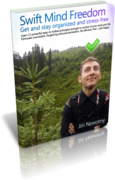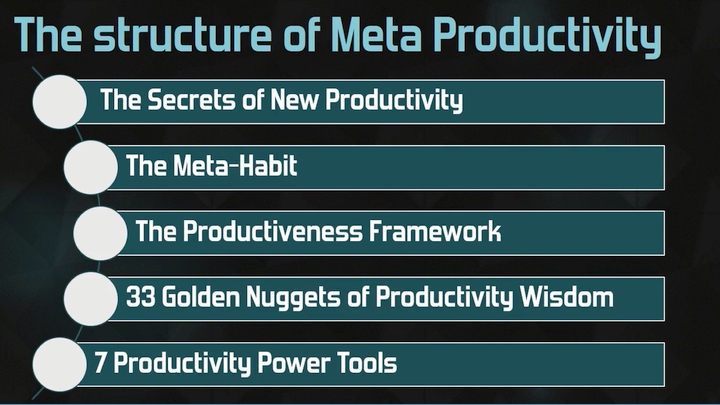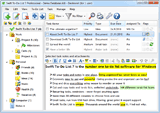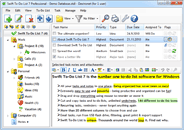A single night of bad sleep can wreak havoc on your productivity for days to come. Sleep is critical for high productivity and well-being.
So, is there something you can do to sleep better at night? Yes, there is! I have 16 tips for you -
Hydrate
It’s better to get up during the night and go to the toilet, than to be woken up by a thirst.
Drink plenty of water during the day, and drink some water before you go to bed. If you have to get up to pee during the night, so be it – it’s better than waking up dehydrated like a mummy.
Tip: You are most dehydrated right when you wake up. Drink 2 glasses of water right after you wake up to get yourself going.
Reduce CO2 in your bedroom
Just 30 minutes of 2 people breathing in a mid-size room can increase CO2 in the room dramatically. High CO2 in the air is bad, because it can increase your heart rate. This leads to poor sleep.
Do you know why people weigh the least in the morning? It’s because we breathe out CO2 during the night. The carbon molecule in the CO2 we breathe out makes most of the weight we lose during the night – the rest is mostly sweat.
To sleep better, ventilate – a lot. Fresh air is important.
Tip: Some smart devices (body scales, thermostats, etc) can measure and track CO2 in the room.
Empty stomach – but not too empty
Digestion takes a lot of energy. For most people, sleeping on a full stomach makes sleep worse.
Tip: Sleeping on a completely empty stomach can also decrease sleep quality for some people. If you are hungry, try eating a banana before bed.
Darkness works
Make your bedroom as dark as possible. Remove any lights, including small LED lights. Blinking lights are the worst. Use the blinds.
The closer the bed time is, the less light you should expose yourself to. This will increase the sleep hormone melatonin production.
Tip: Try wearing an eyemask during the night for a week. If it helps, keep using it!
Tip: Dim all your displays in the evening.
Tip: “F.lux” for PC/Mac can automatically adjust the color temperature of your screen during the day.
Silence works
Remove as much noise sources from your bedroom as possible.
This can be a challenge because you need fresh air too. Open windows brings noise, but they also bring fresh air.
Tip: Try wearing ear plugs.
Love your bed
You spend one third of your life in your bed.
You should get a bed that you TOTALLY love. You should love the mattress, the pillows, the bed sheets, your pajamas. If you don’t, get better ones!
Your bed and everything on it should feel great and be extremely comfortable.
Tip: Try buckwheat pillow. It helps you sweat less during the night and doesn’t deform.
Vigorous exercise, but not right before the bed
If you exercise vigorously during the day, you will have easier time falling asleep.
For most people, exercising right before bed is a bad idea. But stretching might help.
Are you sensitive to caffeine?
Many people are sensitive to caffeine. I sure am. I discovered that when I don’t drink any, I will sleep much better.
In fact, most of my terrible nights were caused by caffeine.
Try this – don’t consume any caffeine for a week or two, and see if you sleep better.
Alcohol makes your sleep lower quality
Consuming alcohol is a trap. It might seem that you sleep just fine after consuming it, but the sleep will not be as restorative.
Alcohol also dehydrates.
Remove the clock
Does the bedroom clock just make you worry that you won’t get enough sleep? Put it away!
If you use an alarm clock, you can usually put it in the adjoining room.
Lower the temperature during the night
Our bodies expect the temperature to be lower during the night. If you can lower the temperature by a few degrees during the night, you will probably sleep better.
Track your sleep
If you are serious about improving your sleep, start logging how many hours of sleep you get each night. Or use a smart wearable to track it for you automatically.
Meditation helps
Meditating just 5 minutes a day has proven positive psychological effects, and can help with sleep as well. Having a better control of your mind makes falling asleep easier.
How to meditate? Just sit with a straight spine for 5 minutes, and focus on your breathing. Whenever your mind wanders, re-focus on the breathing. That’s it.
Consider supplements for better sleep
Supplementing with melatonin can be be useful especially for older people, because melatonin production diminishes as we age. For younger people, it can be useful when travelling or switching time zones.
There are also many herbal teas that promote sleep.
Tip: Lavender has a relaxing effect. You can get a small lavender herbal pillow.
Take a nap
When you don’t get a good night’s rest, take a nap during the day. It actually helps!
Power-naps of about 20 minutes work great for most people.
Get organized
When everything important is written down, you don’t have to worry about remembering it. When you are better organized, you will sleep better.
Tip: When thoughts are racing in your mind while you are lying in bed, write them down.
I’ve written more about this in the post “Why You Can’t Sleep“.
This post has been inspired by Tomas Baranek’s research into sleep [Czech Source].
Related Posts:







